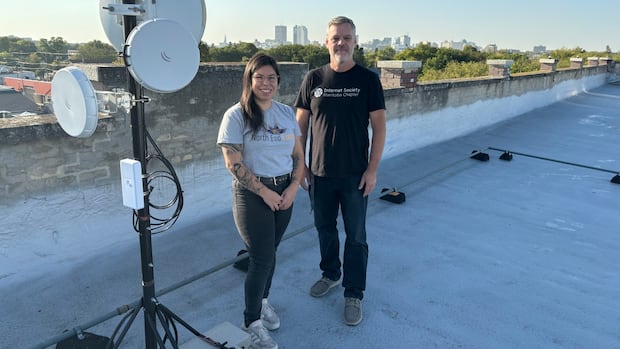A pair of non-profit organizations based in Winnipeg’s North End are taking steps to provide free internet for people in the neighbourhood, hoping the signals will ultimately reach 1,000 households.
“I want to see the entire North End covered, but for just starters we’re aiming for an initial 20 [households], just to kind of see how we can manage it, to get that team going, get the help desk kind of put together so that we have people to support everyone on the network,” said Courtney Comber, executive director of North End Connect.
“Once we have that kind of base built up, then we can start adding more and more.”
Right now, there is one antenna on the roof of Merchants Corner, at the corner of Selkirk Avenue and Andrews Street, and another on the Andrews Street Family Centre. Preparations are underway to install three on the roof of the Ivan Franco Manor on McGregor Street.
The aim is to get those initial 20 households connected sometime this fall, Comber said.
The idea sprouted during the pandemic, within the Merchants Corner building, said Joel Templeman, executive director of the Internet Society Manitoba Chapter.
“The groups that work here and a lot of the non-profits … lost contact with their clients, and the students that they were trying to help couldn’t go to school and were all sent home,” Templeman said.
Merchants Corner is a multipurpose complex with a mix of residential, retail, commercial and educational uses, as well as a public common space. It hosts the University of Winnipeg’s department of inner-city studies and the Community Education Development Association Pathways to Education program.
“There’s amazing, great services here, but one of the things that wasn’t here was technology, technology support, internet connectivity, any of those kinds of things, which made those organizations struggle with communications.”
Reliable, open and free internet is something everyone should have access to, he said.
“Urban centres, even though they’re really well connected with infrastructure, there are areas … usually low-income areas like the North End, that really don’t have enough devices, don’t have access to digital literacy training and, for a number of reasons, have barriers to connect to the Internet.”
Rogers Communications and Shaw Communications used to have a number of open wifi hotspots around the city but they merged in 2023 and this summer, the hotspots were taken offline, Templeman said.
“That’s, we think, a huge issue. There already wasn’t enough places for people to go when the pandemic came. A lot of places closed, a lot of community centres that had, like, a little tech hub or something, closed,” he said.
“So there’s very few places to go to, and those hotspots are essential. So we’re kind of replacing them, I guess, around the neighbourhood.”
The groups have applied for some for some grants to help fund the project, while the Internet Society is an international organization with access to money that other non-profits wouldn’t have, Templeman said.
In addition to supplying the service to the North End, the idea is for locals to maintain the network. The Internet Society has a partnership with R.B. Russell Vocational High School to train students in the technology.
Comber said the plan has been embraced by the neighbourhood.
“It is insane seeing how many people are in support of this initiative. Community members and other local partners and organizations, everyone is coming together to see this kind of come to fruition,” she said.
“This gives people the opportunity to connect with family, go to school, find jobs, connect with resources online that they wouldn’t otherwise have access to or even know about. Without the internet to actually access [those resources] … they’re just going to continue to be left behind.”

